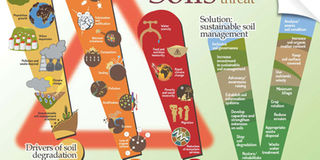How African countries are addressing soil infertility issues

Farmers in Africa are faced with a number of challenges that lead to infertile soils, which in turn affect farm productivity. Some arise as a result of factors such as soil erosion, soil silting, lack of crop rotation, prolonged droughts and low fertiliser use, among others.
Stakeholders from the public and private sectors are partnering to sensitise farmers on how they can keep soils fertile for improved agricultural production.
Reach out
One of the partners is Alliance for Green Revolution in Africa (Agra), which focuses on soil health as critical for biodiversity.
The programme aims at reaching four million smallholder farmers in 13 countries where it is being implemented. These include Kenya, Uganda, Tanzania, Ethiopia, Rwanda, Zambia, Malawi, Mozambique, Ghana, Mali, Niger, Nigeria and Burkina Faso.
Dr Bashir Jama, the programme director, says carbon content of soil is a key indicators of its health and a master variable that controls many of these processes.
It largely governs their capacity to absorb, retain and supply moisture and to sustain active plant growth. Every gram of carbon in soil can retain up to eight grams of water.
It promotes the sustained production of essential food and fibre as well as the capacity of plants and animals to resist disease, insect infestation and climate stresses.
Change practices
Increased soil carbon levels therefore also have the means to reduce reliance on costly fossil fuels and other farm inputs. However, current rates of soil erosion by wind and water across much of Africa now exceeds soil formation.
It is because farmers across the globe are ignoring soil health issues. This is why 2015 was declared as International Year of Soils.
Dr George Bigirwa, the associate director, Programme for Africa’s Seed Systems, in Agra, explains that land management practices can either accelerate or moderate soil degradation. Therefore, farmers need to change their practices to reverse the current trend.
For example, ploughing was seen as good agricultural practice for thousands of years.
However, it is now known that the more often land is ploughed, the faster it loses essential organic matter and the biological activity it supports.
Zero and minimal tillage practices are being encouraged. There is the need to focus on more than use of conventional fertilisation programmes but ensure the structural, mineral and biological health of soils. This is in order to receive all the benefits that healthy soil can provide.
Practices such as use of organic matter in soils, mulching and other farm inputs such as fertiliser are important.
Farmers are expected to focus on adopting farming practices that reduce erosion and improve water use efficiency, such as lightly tilling the soil without turning over the earth or growing crops in terraced fields that efficiently collect and conserve rainwater.
The statistics of farm production in Africa compared to the developed world show quite a big difference as a result of farmers failing to manage their soil health.
While farmers in many parts of the world regularly harvest up to five tonnes of maize per hectare (about 2.5 acres), African farmers typically harvest one tonne.
Figures
The statistics compiled by Agra experts indicate that in Rwanda and Uganda, scientists blame nutrient mining for banana yields that are five to 30 tons per hectare when it should be around 70 tonnes. Cassava yields in Ghana average 10-12 tonnes per hectare when it should be at 40-60 tonnes.
Overall, soil health issues are costing African farmers $4b annually in lost crop productivity.
Dr Cranmer Kayuki Kayizzi, a soil scientist at National Research Laboratories (NaLRI) in Kawanda, explains that the common belief that Ugandan soils are fertile is no longer true because the land has been over-tilled thereby rendering it less productive.
Depend on soil
Farmers in Uganda are advised to carry out a particular farming activity for three years while applying an inorganic fertiliser such as urea, DAP and NPK as well as organic fertiliser like manure. Thereafter, the land should be left to fallow for three years before it is utilised for planting.
Short-term fallow practices are allowed and this involves planting legume crops, which fix nitrogen in the soil.
In light of UN observance of December 5 of every year as World Soils Day, it should be noted that people all over the world depend on soil as major resource which provides food to the population.
This therefore means all stakeholders should be involved in sensitisation of farmers to engage in best farming practices in order to maintain soil fertility.




